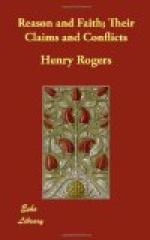* See Archbishop Whately’s admirable discourse, entitled ’The Search after Infallibility, considered in reference to the Danger of Religious Errors arising within the Church, in the primitive as well as in all later Ages.’ He here makes excellent use of the fruitful principle of Butler’s great work, by showing that, however desirable, a priori, an infallible guide would seem to fallible man, God in fact has every where denied it; and that, in denying it in relation to religion, he has acted only as he always acts. ____
In the mean time, that arduous responsibility which attaches to man, and which is obviated neither by an implicit faith in a human infallibility, nor an exclusive reference of that faith to cases in which reason is synonymous with demonstration, that is, to cases which leave no room for it, is at once relieved, and effectually relieved, by the maxim—the key-stone of all ethical truth—that only voluntary error condemns us;—that all we are really responsible for, is a faithful, honest, patient, investigation and weighing of evidence, as far as our abilities and opportunities admit, and a conscientious pursuit of what we honestly deem truth, wherever it may lead us. We concede that a really dispassionate and patient conduct in this respect is what man is too ready to assume he has practised,—and this fallacy cannot be too sedulously guarded against. But that guilty liability to selfdeception, does not militate against the truth of the representation now made. It is his duty to see that he does not abuse the maxim,—that he does not rashly acquiesce in any conclusion that he wishes to be true, or which he is too lazy to examine. If all possible diligence and honesty have been exerted in the search, the statement of Chillingworth, bold as it is, we should not hesitate to adopt, in all the rigour of his own language. It is to the effect, that if ’in him alone there were a confluence of all the errors which have befallen the sincere professors of Christianity, he should not be so much afraid of them, as to ask God’s pardon for them;’ absolutely involuntary error being justly regarded by him as blameless.




